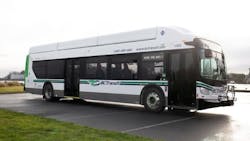BC Transit adds 44 buses, preps for electric vehicles in Victoria
Victoria Regional Transit System in British Columbia is highlighting the 44 new buses it added to its fleet in the fourth quarter of 2022 and preparing to start construction of the infrastructure needed to support the agency’s future electric bus fleet.
“Public transit offers people a greener choice when travelling throughout the greater Victoria area. Working strategically to replace older buses with more efficient ones and simultaneously encouraging people to use transit results in cleaner air and health benefits for all of us,” said Victoria Regional Transit Commission Chair Maja Tait.
44 new buses
The new buses include 15 30-foot medium-duty Vicinity Classic and 21 40-foot heavy-duty New Flyer Xcelsior Compressed Natural Gas (CNG) buses to replace diesel buses at the end of their service life. Eight Alexander Dennis Enviro 500 double decker diesel buses were also added to expand the fleet.
All 44 buses are equipped with passenger USB ports, bike racks that accommodate three-inch tires, white LED destination signs and full driver doors designed to protect the health and safety of drivers and passengers.
Victoria Regional Transit System now has 101 CNG buses and 75 double decker buses. Both types of vehicles support BC Transit’s climate action goals, with the CNG buses part of BC Transit’s Low Carbon Fleet Program, and the double decker vehicles carrying a higher capacity of riders to ease congestion in high traffic areas.
"We know people in Greater Victoria are looking for reliable, affordable and efficient methods of travelling around the region. The addition of 44 new buses expands and accelerates the development of public transit, providing more people that live, work and travel in Greater Victoria with a low-carbon transit option,” said British Columbia Minister of Transportation and Infrastructure Rob Fleming.
The C$34.5 million (US$25.5 million) in funding needed for the 44 buses was shared through the Investing in Canada Infrastructure Program (ICIP), where eligible costs for infrastructure and fleet investments are shared between the governments of Canada, British Columbia, local governments and other partners. Under this funding partnership, the government of Canada contributed more than C$13.7 million (US$10.1 million), the province contributed approximately C$13.8 million (US$10.2 million) and the Victoria Regional Transit Commission funded the remaining, approximately C$6.9 million (US$5.1 million).
“BC Transit is grateful to partner with the government of Canada and the province to purchase fleets that supports our collective climate sustainability goals. The addition of these new buses contributes to our vital transition towards a greener, more efficient transit system for our valued transit customers,” said BC Transit President and CEO Erinn Pinkerton..
Charing infrastructure
Missing from the mix of 44 buses was any mention of electric buses, but BC Transit plans for electric double decker vehicles to be part of its fleet mix in the future, and Victoria Regional Transit plans to place its first 10 electric buses into service in the summer of 2023.
These 10 buses, the first of which arrived in December, will mark the start of BC Transit’s transition to a fully electric fleet by 2040, but before these electric buses can roll, they will need the right support infrastructure.
Construction on this infrastructure is slated to begin in April at BC Transit’s Victoria Gorge Road location and will include 10 charging dispensers, power distribution equipment and one overhead charger for high-speed charging and testing.
In May 2022, BC Transit awarded its first electric bus contract to Proterra. The Victoria Regional Transit electrification project is the first under the contract.
The electric bus project is being also cost shared with the government of Canada and the government of British Columbia that will each contributing 40 percent of eligible costs.
About the Author

Mischa Wanek-Libman
Group Editorial Director
Mischa Wanek-Libman is director of communications with Transdev North America. She has more than 20 years of experience working in the transportation industry covering construction projects, engineering challenges, transit and rail operations and best practices.
Wanek-Libman has held top editorial positions at freight rail and public transportation business-to-business publications including as editor-in-chief and editorial director of Mass Transit from 2018-2024. She has been recognized for editorial excellence through her individual work, as well as for collaborative content.
She is an active member of the American Public Transportation Association's Marketing and Communications Committee and served 14 years as a Board Observer on the National Railroad Construction and Maintenance Association (NRC) Board of Directors.
She is a graduate of Drake University in Des Moines, Iowa, where she earned a Bachelor of Arts degree in Journalism and Mass Communication.
